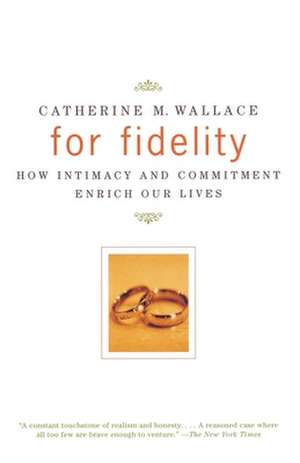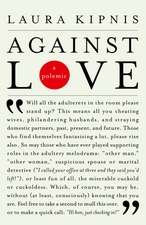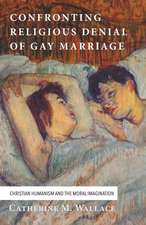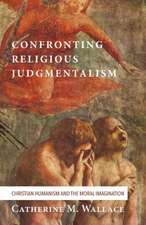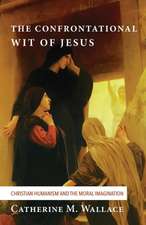For Fidelity: Reflections on Men and Wilderness
Autor Catherine M. Wallaceen Limba Engleză Paperback – 31 ian 1999
At a time when emotional commitments are increasingly fragile and short-lived, Wallace makes a direct and eloquent plea on behalf of sexual fidelity—its blessings, its demands, its moral and emotional necessity.
Preț: 87.43 lei
Nou
Puncte Express: 131
Preț estimativ în valută:
16.73€ • 17.89$ • 13.95£
16.73€ • 17.89$ • 13.95£
Carte disponibilă
Livrare economică 27 martie-10 aprilie
Preluare comenzi: 021 569.72.76
Specificații
ISBN-13: 9780375700729
ISBN-10: 0375700722
Pagini: 192
Dimensiuni: 139 x 218 x 11 mm
Greutate: 0.25 kg
Editura: Vintage
ISBN-10: 0375700722
Pagini: 192
Dimensiuni: 139 x 218 x 11 mm
Greutate: 0.25 kg
Editura: Vintage
Notă biografică
Catherine M. Wallace was born in Chicago in 1950. She received her Ph.D. from the University of Michigan in 1977 and was Assistant Professor of English at Northwestern University from 1976 to 1982. She set aside her scholarly career in literary theory to stay home full-time with newborn twins and a two-year-old--all three of whom are now in high school. She has spent the last fifteen years reading eclectically, speaking and writing about literary approaches to spiritual issues, and working as a homemaker. Her writing has appeared in pamphlets published by Forward Movement Publications and in scholarly journals.
From the Hardcover edition.
From the Hardcover edition.
Extras
Intimacy in Relationships
Casual Sex
I argued throughout the preceding chapter, in various ways, that sexual desire is far more than a simple physiological need. Sexual desire is powerfully and intricately interwoven with the deepest levels of human identity and with the most difficult questions we have about who we are or what it means to be human. Sexual desire can be repressed, or it can be heedlessly indulged, or it can become a calculated part of a marketplace exchange. Or, I will propose in this chapter, sexual desire can be integrated into the whole of who we are. The question, of course, is how. How or where does sexual desire "belong" in the whole that we are?
The answer demands a return to my initial observation about sexual desire: It cannot be genuinely satisfied on the cheap or by the solitary individual. At its most potent, most vital, most delightful levels, sexual desire must be reciprocated to be sated. That's why we cannot "locate" an appropriate sexuality without considering the human relationship in which it is realized or enacted. We need to know the basis of the interaction in which sexual intercourse participates. Is it really mutual, for instance? Are both partners offering and seeking the same things? Consider rape, or prostitution, or the sexual abuse of a child. Consider how sexual access has been demanded as a condition of employment, promotion, business contracts, or social acceptance. The disparities are self-evident. It's easy to see what's wrong, which is a first step toward articulating an appropriate sexual relationship.
It may not be as easy to see what is wrong with what I have called "marketplace" sexual ethics. Consider this scenario, for instance: Two adults meet at one of those exhausting and tedious professional meetings held in banal hotels near the airports of cold, bleak cities. After three days of grueling seminars predicting the imminent collapse of the industry that employs them, they decide to join a few friends in skipping the Annual Self-Congratulatory Dinner. They pile themselves into a couple of cabs and head off for real food somewhere remote from the peculiar antiseptic smell of big hotels. They share a meal and a few drinks, grousing and joking and telling stories in the usual friendly way of bored and lonely strangers at meetings. En route back to the hotel, the two people we are watching find themselves distinctly enjoying the physical attraction that has buzzed about the edges of their interactions over the last few hours and days. They linger in the lobby as the group disperses, quite aware that they
are very attracted to each other.
There is the possibility here of a free, independent sexual exchange between mature adults who are equal to each other in age, status, and so forth: just tonight, no strings, no phone calls later, no promises, and no regrets. Good contraception, let us suppose. Safe sex. Privacy assured. Suppose both are single and neither is willing to consider a permanent relationship. Or suppose they are, both of them, actively looking for life partners; or suppose one is. Or suppose one or both are married. Under any of these circumstances, is a casual sexual encounter OK?
My short answer in any of these situations is no, and my long answer is the burden of this chapter. Casual sexual encounters are morally wrong because the exchange is partial even when it is entirely equal or open or honest. Sex in these situations is not genuinely reciprocal but rather mutually exploitative and, ultimately, mutually self-denigrating. In such an exchange, each regards his or her own sexual desire as a primarily physiological need essentially separable from the deeper psychological and emotional union that is physically enacted in sexual intercourse. I contend that we cannot split ourselves into parts like that.
Body and heart or soul are one. Any attempt to dissociate them is both doomed and dangerous, and that is how casual sex injures even free and willing participants. It severs vital connections within the self, thereby silencing or at least muting one of the most powerful and literally vital foundations of our richest and most creative relationships with other people. Casual sex easily devastates the capacity for serious sex.
This risk remains inescapable even if the sex is much less casual than this imaginary encounter between people who have known each other only briefly. I contend that we are not wise to regard sexual intercourse as an essentially ordinary and acceptable expression of affection between men and women who have made no permanent commitment to each other. Of course, many people will disagree with me, in effect arguing that sexual desire can be merely an appetite or a friendly gesture in some relationships and yet still retain its role as the symbolic embodiment of commitment when they are ready to make that sort of commitment. The disagreement has less to do with sex, I believe, than with the philosophy of symbol and the psychology of symbolic expression and perception--which leads quickly into complex theories of imagination and creativity.
Those woods are lovely, dark and deep; let me but steal a twig and then keep going. I said at the beginning that sexual fidelity is an art, and like all arts it is dependent upon disciplines and practices learned and sustained over time and within communities. Let me take that idea one step further. These disciplines and practices--and especially the most embodied or material and "technical" of them--provide the crucial foundation for symbolic perception and expression. The glorious coherence and lucidity and passion of a fine musical performance are not possible except through years of excruciating discipline, both in the exact actions of fingers or other parts of the body and in the detailed material and technical aspects of music and musical composition. Literature too involves an array of word choices and technical strategies that critics spend lifetimes trying to understand and to appreciate. The art that is sexual fidelity also depends upon a deeply complex, not fully conscious array of spiritual and m
aterial aesthetic practices and disciplines. Casual sex, even between good friends, threatens to inhibit or unduly complicate the practice of faithful sex just as, in any artistic practice, it is difficult to overcome "careless" techniques learned early in one's career.
One does not need to be an artist or art critic to know how this reality works. Mistype a word once, and of course you are apt to keep mistyping it that way for the rest of the day. In the era before spell-checkers, I copied the list of words I persistently misspelled onto the inside cover of the dictionary I still keep next to my keyboard: I gave up hope of getting them straight in my mind. It's and its; to, too, two; that and which: Get them confused for too long early in life, and you will be doomed to keeping them taped to your monitor for the rest of your days. That's not a matter of intelligence. It's the power of embodiment, eyes and fingers together establishing neuron pathways.
As recent reports about the brain document, we are all the creatures of past experience, the more powerfully so in the less conscious and more highly embodied aspects of our lives. Erotic responsiveness is extraordinarily complex and subtle, so we are wise indeed to approach its depths with great care for what we understand to be its ultimate significance in our lives. To the extent that sexual fidelity is understood to be a central virtue, casual sex of any kind is, at the very least, an unwise risk. Plenty of folks come through apparently unscathed, I realize. But I still think it is a significant risk, particularly for people who might be sexually active for ten or fifteen years prior to marriage. For a vocalist or a violinist, that much "bad practice" would be devastating.
We teach our kids to be honest in all things, even in small things, because life's most important moments of costly integrity depend upon exactly the same consistent spiritual discipline and practice across time. We correct their lapses not in high moral outrage but with the quiet persistence of piano teachers reproving a stiff flat finger or baseball coaches correcting batting stance: "Not like that, like this." "Here's how," taught with care and learned with care, involves the transmission of many "habits" whose meaning and value become clear only after a long time. People achieve full or mature integrity only by internalizing it so that they know for themselves and in themselves exactly what is at stake in any particular situation they face as adults. The same is true of sexual fidelity: It can't be reduced to a simple list of "do" and "don't" that will obviate the need to develop mature judgment and self-knowledge. The best guide to sexual fidelity is a life of fidelity--to self and to other--in all of our social encounters.
Casual Sex
I argued throughout the preceding chapter, in various ways, that sexual desire is far more than a simple physiological need. Sexual desire is powerfully and intricately interwoven with the deepest levels of human identity and with the most difficult questions we have about who we are or what it means to be human. Sexual desire can be repressed, or it can be heedlessly indulged, or it can become a calculated part of a marketplace exchange. Or, I will propose in this chapter, sexual desire can be integrated into the whole of who we are. The question, of course, is how. How or where does sexual desire "belong" in the whole that we are?
The answer demands a return to my initial observation about sexual desire: It cannot be genuinely satisfied on the cheap or by the solitary individual. At its most potent, most vital, most delightful levels, sexual desire must be reciprocated to be sated. That's why we cannot "locate" an appropriate sexuality without considering the human relationship in which it is realized or enacted. We need to know the basis of the interaction in which sexual intercourse participates. Is it really mutual, for instance? Are both partners offering and seeking the same things? Consider rape, or prostitution, or the sexual abuse of a child. Consider how sexual access has been demanded as a condition of employment, promotion, business contracts, or social acceptance. The disparities are self-evident. It's easy to see what's wrong, which is a first step toward articulating an appropriate sexual relationship.
It may not be as easy to see what is wrong with what I have called "marketplace" sexual ethics. Consider this scenario, for instance: Two adults meet at one of those exhausting and tedious professional meetings held in banal hotels near the airports of cold, bleak cities. After three days of grueling seminars predicting the imminent collapse of the industry that employs them, they decide to join a few friends in skipping the Annual Self-Congratulatory Dinner. They pile themselves into a couple of cabs and head off for real food somewhere remote from the peculiar antiseptic smell of big hotels. They share a meal and a few drinks, grousing and joking and telling stories in the usual friendly way of bored and lonely strangers at meetings. En route back to the hotel, the two people we are watching find themselves distinctly enjoying the physical attraction that has buzzed about the edges of their interactions over the last few hours and days. They linger in the lobby as the group disperses, quite aware that they
are very attracted to each other.
There is the possibility here of a free, independent sexual exchange between mature adults who are equal to each other in age, status, and so forth: just tonight, no strings, no phone calls later, no promises, and no regrets. Good contraception, let us suppose. Safe sex. Privacy assured. Suppose both are single and neither is willing to consider a permanent relationship. Or suppose they are, both of them, actively looking for life partners; or suppose one is. Or suppose one or both are married. Under any of these circumstances, is a casual sexual encounter OK?
My short answer in any of these situations is no, and my long answer is the burden of this chapter. Casual sexual encounters are morally wrong because the exchange is partial even when it is entirely equal or open or honest. Sex in these situations is not genuinely reciprocal but rather mutually exploitative and, ultimately, mutually self-denigrating. In such an exchange, each regards his or her own sexual desire as a primarily physiological need essentially separable from the deeper psychological and emotional union that is physically enacted in sexual intercourse. I contend that we cannot split ourselves into parts like that.
Body and heart or soul are one. Any attempt to dissociate them is both doomed and dangerous, and that is how casual sex injures even free and willing participants. It severs vital connections within the self, thereby silencing or at least muting one of the most powerful and literally vital foundations of our richest and most creative relationships with other people. Casual sex easily devastates the capacity for serious sex.
This risk remains inescapable even if the sex is much less casual than this imaginary encounter between people who have known each other only briefly. I contend that we are not wise to regard sexual intercourse as an essentially ordinary and acceptable expression of affection between men and women who have made no permanent commitment to each other. Of course, many people will disagree with me, in effect arguing that sexual desire can be merely an appetite or a friendly gesture in some relationships and yet still retain its role as the symbolic embodiment of commitment when they are ready to make that sort of commitment. The disagreement has less to do with sex, I believe, than with the philosophy of symbol and the psychology of symbolic expression and perception--which leads quickly into complex theories of imagination and creativity.
Those woods are lovely, dark and deep; let me but steal a twig and then keep going. I said at the beginning that sexual fidelity is an art, and like all arts it is dependent upon disciplines and practices learned and sustained over time and within communities. Let me take that idea one step further. These disciplines and practices--and especially the most embodied or material and "technical" of them--provide the crucial foundation for symbolic perception and expression. The glorious coherence and lucidity and passion of a fine musical performance are not possible except through years of excruciating discipline, both in the exact actions of fingers or other parts of the body and in the detailed material and technical aspects of music and musical composition. Literature too involves an array of word choices and technical strategies that critics spend lifetimes trying to understand and to appreciate. The art that is sexual fidelity also depends upon a deeply complex, not fully conscious array of spiritual and m
aterial aesthetic practices and disciplines. Casual sex, even between good friends, threatens to inhibit or unduly complicate the practice of faithful sex just as, in any artistic practice, it is difficult to overcome "careless" techniques learned early in one's career.
One does not need to be an artist or art critic to know how this reality works. Mistype a word once, and of course you are apt to keep mistyping it that way for the rest of the day. In the era before spell-checkers, I copied the list of words I persistently misspelled onto the inside cover of the dictionary I still keep next to my keyboard: I gave up hope of getting them straight in my mind. It's and its; to, too, two; that and which: Get them confused for too long early in life, and you will be doomed to keeping them taped to your monitor for the rest of your days. That's not a matter of intelligence. It's the power of embodiment, eyes and fingers together establishing neuron pathways.
As recent reports about the brain document, we are all the creatures of past experience, the more powerfully so in the less conscious and more highly embodied aspects of our lives. Erotic responsiveness is extraordinarily complex and subtle, so we are wise indeed to approach its depths with great care for what we understand to be its ultimate significance in our lives. To the extent that sexual fidelity is understood to be a central virtue, casual sex of any kind is, at the very least, an unwise risk. Plenty of folks come through apparently unscathed, I realize. But I still think it is a significant risk, particularly for people who might be sexually active for ten or fifteen years prior to marriage. For a vocalist or a violinist, that much "bad practice" would be devastating.
We teach our kids to be honest in all things, even in small things, because life's most important moments of costly integrity depend upon exactly the same consistent spiritual discipline and practice across time. We correct their lapses not in high moral outrage but with the quiet persistence of piano teachers reproving a stiff flat finger or baseball coaches correcting batting stance: "Not like that, like this." "Here's how," taught with care and learned with care, involves the transmission of many "habits" whose meaning and value become clear only after a long time. People achieve full or mature integrity only by internalizing it so that they know for themselves and in themselves exactly what is at stake in any particular situation they face as adults. The same is true of sexual fidelity: It can't be reduced to a simple list of "do" and "don't" that will obviate the need to develop mature judgment and self-knowledge. The best guide to sexual fidelity is a life of fidelity--to self and to other--in all of our social encounters.
Recenzii
"A constant touchstone of realism and honesty.... A reasoned case where all too few are brave enough to venture. ?The New York Times
"[Wallace] makes an eloquent case for sexual fidelity." ?The New Yorker
"[Wallace] is a stylist and thinker of uncommon intellectual charm; she's that rare creature among writers, someone both witty and wise.... [For Fidelity is] rich and subtle." ?Hungry Mind Review
"An intriguing and convincing set of arguments for fidelity in marriage, in relationships, and in life in general." ?Houston Chronicle
"[Wallace] makes an eloquent case for sexual fidelity." ?The New Yorker
"[Wallace] is a stylist and thinker of uncommon intellectual charm; she's that rare creature among writers, someone both witty and wise.... [For Fidelity is] rich and subtle." ?Hungry Mind Review
"An intriguing and convincing set of arguments for fidelity in marriage, in relationships, and in life in general." ?Houston Chronicle
Descriere
Drawing inspiration from both contemporary psychology and ancient spiritual traditions, Wallace presents her vision of marriage as an art and a spiritual exercise.
